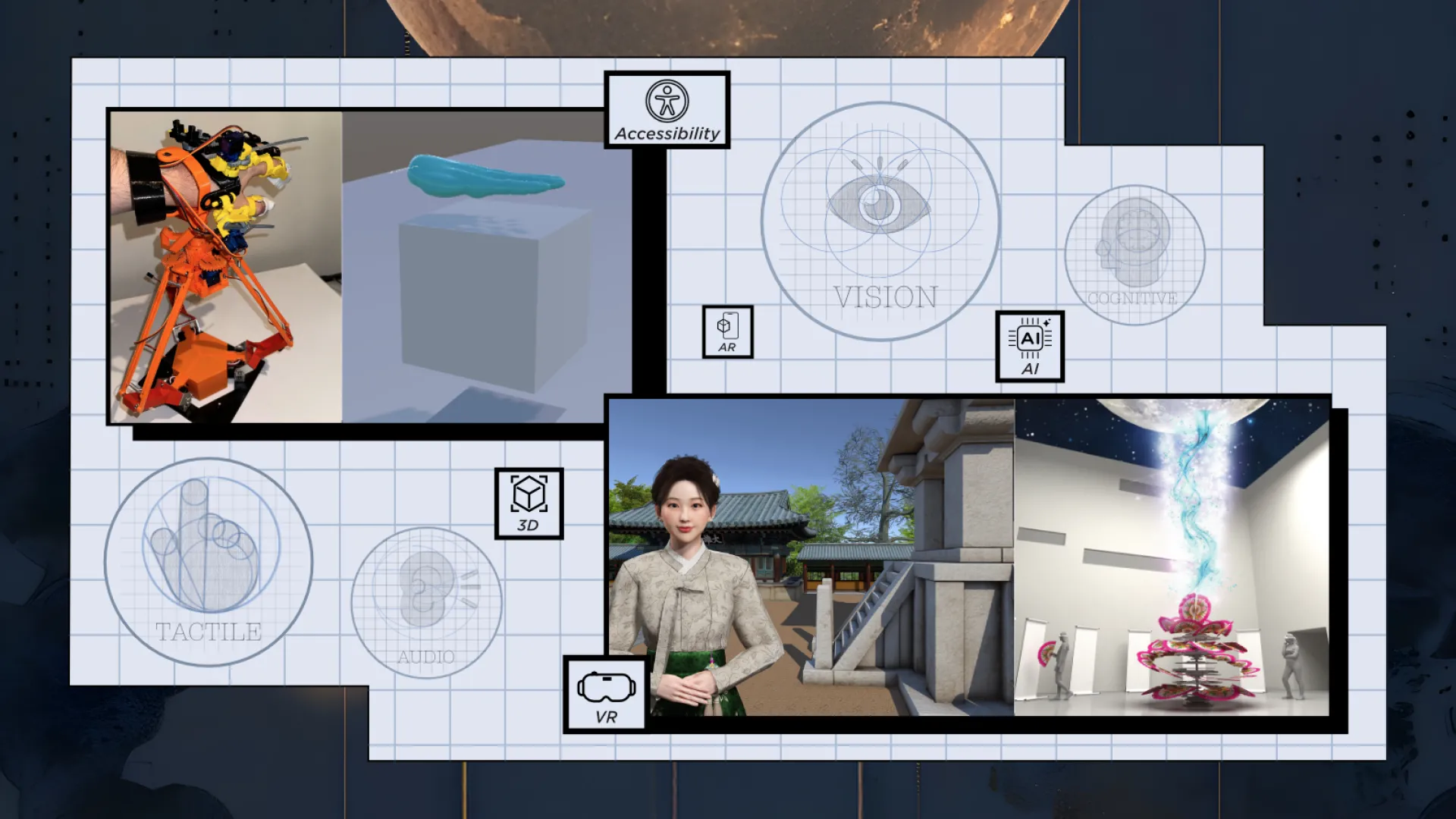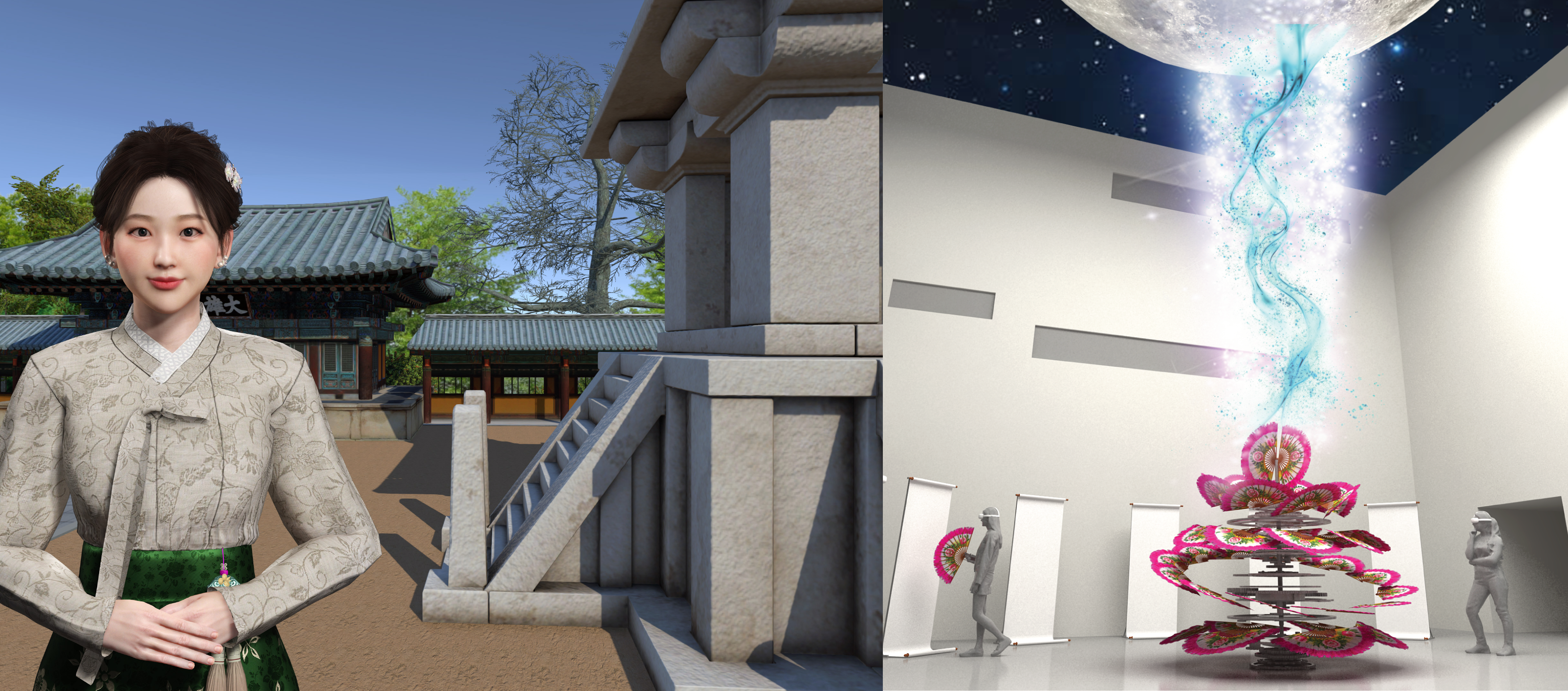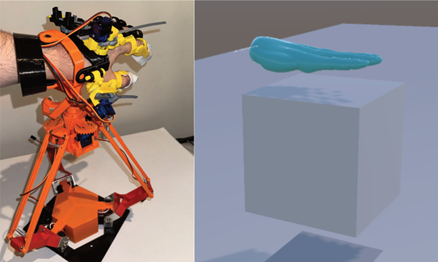Accessible Digital Experience Design & Korean Visual Culture VR Expo 2025
Dates: June 28-30, July 2, 2:00 - 5:00pm (Closed July 1st)
Opening Reception: June 27, 5:00pm - 7:00pm
Venue: The Great Hall, MCA 270 - 100 McCaul St.


This joint exhibition and expo merges student projects from the Perceptual Artifacts Lab at OCAD University with immersive explorations of Korean visual culture from Hongik University in South Korea. It showcases how VR, AR, and mixed reality enhance accessibility and engagement, featuring touch-based interfaces and audio tools for blind/low-vision and neurodivergent users. An AI-powered digital curator leads voice-interactive tours through 3D stone pagodas, scroll-style videos, and Blue Moon’s contemporary art, while featured information-communication technology projects highlight how spatial and non-verbal cues shape digital accessibility in a rich, multi-sensory environment.
Exhibit 1: Explore Korean Visual Culture Through Immersive VR
Dates: June 28-30, July 2, 2:00 - 5:00pm (Closed July 1st)
Opening Reception: June 27, 5:00pm - 7:00pm
Venue: The Great Hall, MCA 270 - 100 McCaul St.
“Explore Korean Visual Culture Through Immersive VR” is a multi-sensory exhibition that brings Korean visual culture to life through advanced mixed reality (MR) technology. It uses virtual reality (VR), augmented reality (AR), and immersive projection systems (CAVE) to create shared experiences for multiple users, enhanced by artificial intelligence and spatial computing. At the heart of the exhibition is a digital human curator, designed for real-time interaction and powered by AI. This curator guides visitors through a rich blend of cultural and artistic content streamed via the cloud, allowing for an innovative fusion of technology and tradition.
Visitors can explore virtual recreations of Korean stone pagodas and modern artworks in a shared 3D space, using devices like the Meta Quest 3 in both VR and AR modes. The experience supports real-time interaction and narration, making it both educational and engaging. In addition, a separate video-based experience features an AI curator that responds to voice questions, offering insights into the art and history on display.
Click on the link below to sign up for a demonstration of the Korean Modern Artwork & Architecture Exhibit:
https://calendly.com/accesskculturevr/signup-korean-modern-artwork-architecture-vr-exhibit
The exhibition also includes content by the artist group Blue Moon, showcasing scroll-style videos and 3D object-based artworks—also accessible through the same cloud-powered, multi-user MR platform.
Click on the link below to sign up for a demonstration of the Blue Moon Object-Based Artwork and Video exhibit:
https://calendly.com/accesskculturevr/signup-blue-moon-object-based-artwork-and-video

Exhibit 2: Multi-Sensory Expo: Haptic, Spatial and Auditory Interaction Design for Accessibility
Dates: June 30 & July 2, 2:00 - 5:00pm (Closed July 1st)
Venue: The Great Hall, MCA 270 - 100 McCaul St.
Have you ever struggled to communicate during online meetings when others leave their cameras or microphones off? It’s not just about seeing faces—it’s about missing crucial non-verbal cues like facial expressions, gestures, and tone and volume of voice that help us communicate effectively. These are spatial and “paralinguistic” (i.e. verbal non-linguistic) cues, and their absence can make it extremely difficult to read the intentions of others.
For many people who must access these cues non-visually or struggle with non-verbal communication, such as blind, partially-sighted or neurodivergent individuals, this experience is part of daily life. These cues may be difficult to perceive or interpret, which can significantly affect how relationships and communication function. Our research looks into alternative means of representing these cues, for example, through different sensory modalities than vision, or making numerical data tangible. Unfortunately, current information and communication technologies (ICTs), such as video conferencing, web platforms, apps, and shared digital spaces, often fail to provide these more inclusive options for people with diverse perceptual and cognitive needs.
This multi-sensory expo, hosted by the Perceptual Artifacts Lab, showcases its students’ innovative work, with projects including haptic interfaces, mixed and virtual reality environments with spatial audio, and accessible web and app navigation tools—all designed in collaboration with people who have lived experience of these challenges. These efforts aim to reimagine how we communicate via ICTs, ensuring that everyone can fully participate, express themselves, and connect with others.
Contact us for more information about this event at: accesskculturevr@gmail.com
Please be advised that OCAD U hosted events may be documented through photographs and video. These images may be used by the University for promotional, advertising, and educational purposes. By participating in our events, both on campus and off-site, you consent to allowing OCAD University to document and use your image and likeness. However, if you do not want us to use a photo or video of you or your child, please don’t hesitate to let us know when you arrive at the event. You’re also welcome to get in touch with OCAD University’s Marketing & Communications office: communications@ocadu.ca.
Be mindful of those in our community who have scent sensitivities; please help OCAD U maintain a healthy, scent-free campus.
